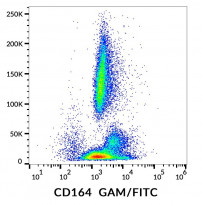ARG42425
anti-CD164 antibody [67D2]
anti-CD164 antibody [67D2] for Flow cytometry,ICC/IF,Immunoprecipitation,Western blot and Human
Overview
| Product Description | Mouse Monoclonal antibody [67D2] recognizes CD164 |
|---|---|
| Tested Reactivity | Hu |
| Tested Application | FACS, ICC/IF, IP, WB |
| Specificity | The mouse monoclonal antibody 67D2 recognizes an extracellular class III epitope (not sensitive to sialidase, N-glycanase, O-glycosidase, and O-sialoglycoprotease) of CD164, a sialomucin expressed in hematopoietic myeloid and erythroid progenitors, activated basophils, and in various carcinomas and leukemic cells. |
| Host | Mouse |
| Clonality | Monoclonal |
| Clone | 67D2 |
| Isotype | IgG1 |
| Target Name | CD164 |
| Antigen Species | Human |
| Immunogen | Breast tumor cell line T-47D. |
| Conjugation | Un-conjugated |
| Alternate Names | MGC-24; Multi-glycosylated core protein 24; CD antigen CD164; Endolyn; endolyn; Sialomucin core protein 24; MGC-24v; MUC-24 |
Application Instructions
| Application Suggestion |
|
||||||||||
|---|---|---|---|---|---|---|---|---|---|---|---|
| Application Note | WB: Under non-reducing condition. * The dilutions indicate recommended starting dilutions and the optimal dilutions or concentrations should be determined by the scientist. |
Properties
| Form | Liquid |
|---|---|
| Purification | Purification with Protein A. |
| Buffer | PBS and 15 mM Sodium azide. |
| Preservative | 15 mM Sodium azide |
| Concentration | 1 mg/ml |
| Storage Instruction | For continuous use, store undiluted antibody at 2-8°C for up to a week. For long-term storage, aliquot and store at -20°C or below. Storage in frost free freezers is not recommended. Avoid repeated freeze/thaw cycles. Suggest spin the vial prior to opening. The antibody solution should be gently mixed before use. |
| Note | For laboratory research only, not for drug, diagnostic or other use. |
Bioinformation
| Database Links | |
|---|---|
| Gene Symbol | CD164 |
| Gene Full Name | CD164 molecule, sialomucin |
| Background | This gene encodes a transmembrane sialomucin and cell adhesion molecule that regulates the proliferation, adhesion and migration of hematopoietic progenitor cells. The encoded protein also interacts with the C-X-C chemokine receptor type 4 and may regulate muscle development. Elevated expression of this gene has been observed in human patients with Sezary syndrome, a type of blood cancer, and a mutation in this gene may be associated with impaired hearing. [provided by RefSeq, Oct 2016] |
| Function | Sialomucin that may play a key role in hematopoiesis by facilitating the adhesion of CD34(+) cells to the stroma and by negatively regulating CD34(+)CD38(lo/-) cell proliferation. Modulates the migration of umbilical cord blood CD133+ cells and this is mediated through the CXCL12/CXCR4 axis. May play an important role in prostate cancer metastasis and the infiltration of bone marrow by cancer cells. Promotes myogenesis by enhancing CXCR4-dependent cell motility. Positively regulates myoblast migration and promotes myoblast fusion into myotubes (By similarity). [UniProt] |
| Cellular Localization | Lysosome membrane; Single-pass type I membrane protein. Endosome membrane; Single-pass type I membrane protein. Cell membrane; Single-pass type I membrane protein. Isoform 2: Secreted. [UniProt] |
| Calculated MW | 21 kDa |
| PTM | Highly N- and O-glycosylated; contains sialic acid. The motif Ser-Gly may serve as the site of attachment of a glycosaminoglycan side chain. [UniProt] |
Images (1) Click the Picture to Zoom In






